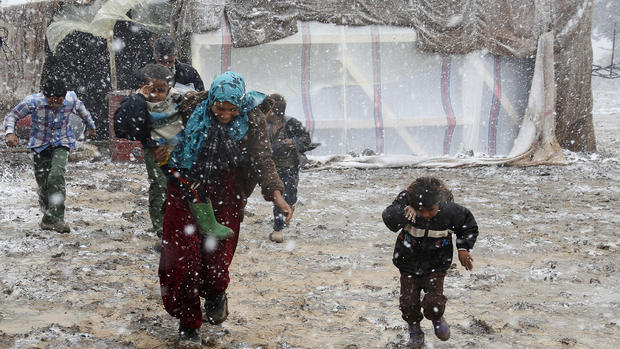$2.4 billion pledged for war-ravaged Syria, U.N. says
KUWAIT CITY -- A fundraising conference in Kuwait generated at least $2.4 billion in pledges Wednesday from international donors to alleviate the suffering of Syrians affected by their country's civil war, U.N. Secretary-General Ban Ki-moon said.
Kuwait, the United States
and other donor nations had promised more than $1.2 billion of new funding
early in the day as the conference started. Aid officials hope the drive will
help cover the billions of dollars needed this year.
The United Nations is asking for a staggering $6.5 billion this year to help Syrians affected by the war, its largest-ever funding appeal for a single crisis.
"The $6.5 billion U.N. aid request for Syria reflects the international community's failure to find a solution to the three-year civil war," CBS News’ Pamela Falk said last month.
Officials did not expect to raise the
entire amount in Kuwait but do hope
the gathering focuses greater international attention on the conflict.
Ban said humanitarian and development agencies "face unprecedented demands" because of the crisis, and that it "is vital ... the burden be shared" in helping meet Syria's growing aid needs.
Kuwait's emir, Sheik Sabah Al Ahmad Al Sabah, opened the conference by pledging $500 million, significantly topping the OPEC member nation's pledge of $300 million last year.
He pressed the U.N. Security Council to exert greater effort in bringing an end to the crisis, and urged all those fighting in Syria to "put the fate of their country and the safety of their people above all other considerations."
Kuwait's Gulf neighbor Saudi Arabia promised an additional $60 million, saying that would boost its existing round of funding to a total $250 million, though it did not specify the time period. It promised $300 million at last year's conference.
Nearby Qatar also promised $60 million Wednesday.
U.S. Secretary of State John Kerry said the U.S. pledge of $380 million will bring brings America's humanitarian aid contribution to Syrian victims to $1.7 billion since the war began.
Half of the money - $177 million - will go to U.N. programs for victims still in Syria. The rest is for neighboring nations that have taken in an estimated 2.3 million refugees.
"We are under no illusion that our job, or any of our jobs here, are to just write a check," said Kerry, who blamed Syrian President Bashar Assad for starving his people and blocking international aid workers from providing aid in some of Syria's hardest-hit areas.
"The international community must use every tool at our disposal to draw the world's attention to these offenses," he said. "'They are not just offenses against conscience. They also are offenses against the laws of war."
The United Kingdom announced a pledge of 100 million pounds, or $164 million, with International Development Secretary Justine Greening saying that "the scale of suffering that this crisis has caused is hard to exaggerate."
Other donor countries included Norway, Luxembourg and even violence-wracked Iraq, which promised $13 million in aid.
Much of last year's $1.5 billion raised in Kuwait total came from Western-allied Gulf states. Humanitarian needs have escalated dramatically since a similar donor conference in the oil-rich Gulf nation last January.
The United Nations warns that 9.3 million people inside Syria need assistance as the conflict grinds on, including some 6.5 million inside Syria who have been driven from their homes.
More than 2 million people have been uprooted from their homes, many scattered in refugee camps and informal settlements dotting neighboring Lebanon, Jordan, Turkey and Iraq.
The Kuwait meeting, chaired by Ban, takes place a week before peace talks on Syria are due to be held in Switzerland. The U.N. chief on Tuesday visited a Syrian refugee camp in northern Iraq, where he praised the largely autonomous Kurdish regional government for hosting more than 200,000 refugees on territory it administers.
